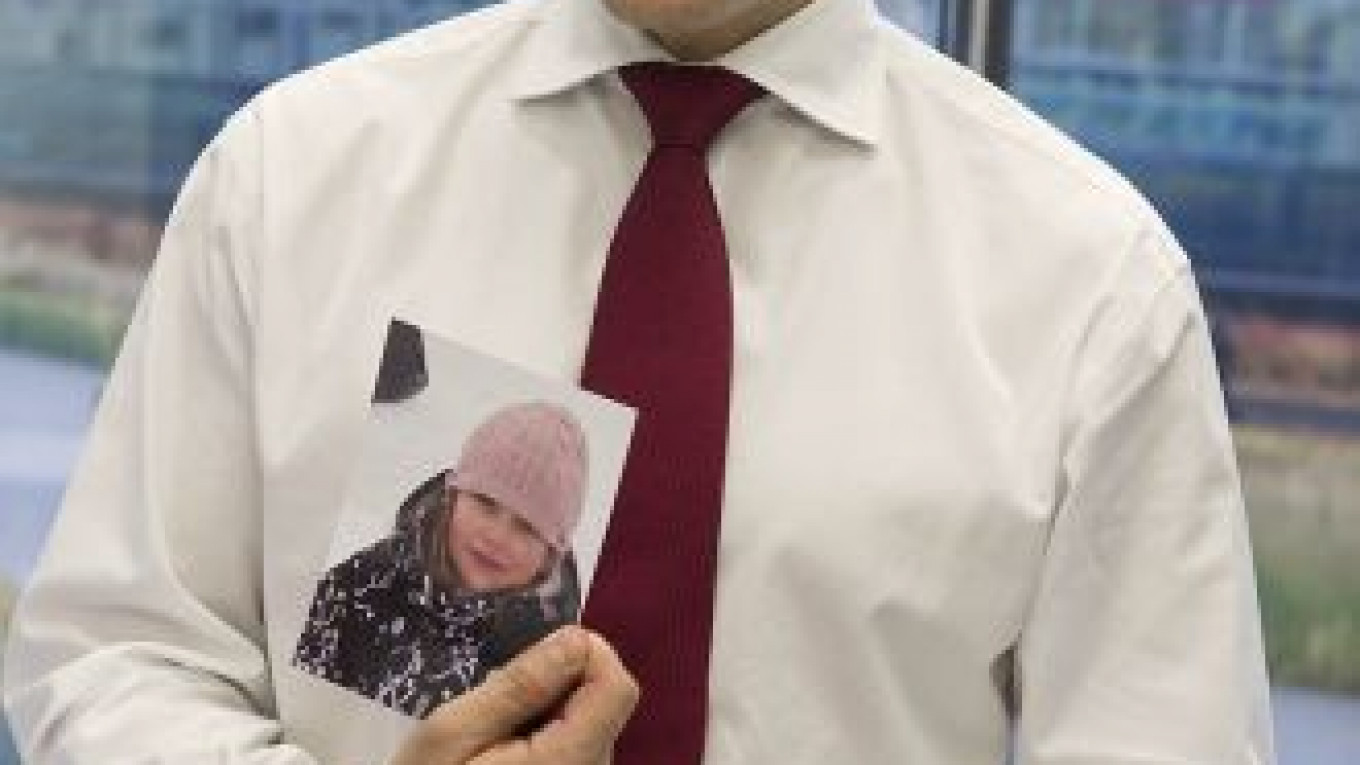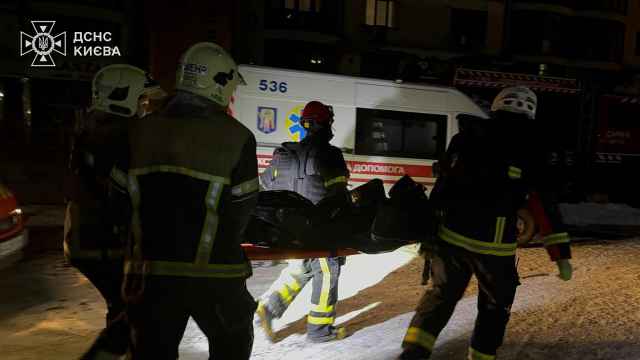The adage about success being the fruit of hard work and good luck, attributed to the likes of Thomas Jefferson, Samuel Goldwyn and a host of sporting personalities, has a strong adherent in Jere Calmes.
But for the 43-year-old Calmes, deputy CEO of the reborn Tele2 Russia, the balance between work and luck has a distinctly Russian flavor, which is perhaps natural considering that he has been involved with the country for 22 years and lived here for 13.
Calmes' initial decision to study Russian during his undergraduate studies at Bates College in Maine was based on making sure that nothing interrupted his ski team training time.
Then a four month undergraduate exchange program in Leningrad infected him with "the bug that bit people back in the early '90s," Calmes said. He headed to Moscow after graduating in 1992.
Jere Calmes
Education
1992 — Bates College, Lewiston, Maine; Bachelor of Arts in political science2002 — Wharton School of Management; Executive Development Program
Work experience
2008-Present — Tele2, including board member (Tele2 AB, Sweden, 2008-13); chief executive officer (Tele2 Russia, February-June 2013); and deputy CEO responsible for operations (July 2013-Present)2012 — Fast Lane Ventures, Moscow; managing director
2010-12 — Adva Capital, Moscow; managing director
2007-09 — Pharmacy Chain 36.6, Moscow; president and CEO
2006-07 — Wind Telecommunicazione, Rome; chief operating officer
2001-06 — VimpelCom, Moscow; including vice president of operations, executive vice president and general manager
1995-2001 — Motorola, including commercial director (St. Petersburg Telecom, 1995-97); operations director (London, 1997-98); customer services and credit control director (MobiNil, Cairo, 1998-2001)
1992-94 — VimpelCom, Moscow, commercial manager.
Favorite book: Any Tom Clancy novel
Reading now: "The Zappos Experience" (2011) by Joseph Michellin
Movie pick: "Legend 17" (2013), directed by Nikolai Lebedev
Favorite Moscow restaurant: Uilliam's on 20a Malaya Bronnaya and Chicago Prime, 8a Strasnoi Bulvar
Weekend getaway destination: Fresh Wind Hotel, Kurovo, Moscow region
A chance meeting in a Moscow hotel bar led him to Augie Fabela, the American entrepreneur who would become a co-founder of telecommunications giant VimpelCom. They created the company when they realized there was more potential in providing mobile telephony than manufacturing equipment for it, even though there was virtually no regulatory framework to operate in.
Calmes said his decision-making skills have matured, as have the rules of the Russian telecoms market. As a board member of global Tele2, he worked with the Russian regulator to gain a role for his company in building the next-generation network. When that failed, he took over the helm of Tele2 Russia to help it find a way to maintain and expand its position here — which led to the sale of the company to VTB Capital, and what many telecom analysts say will be an eventual tie up with Rostelecom and the creation of another major player on the 4G market.
"You come to Russia, and you know the rules of the game, more or less," Calmes said.
He accepts those rules, has occasionally tried to influence how they are written, and has used them to maximize competitive advantage, whether in leading the Russian operations of global companies like Motorola and Tele2, or building Russian companies like VimpelCom and 36.6 into world-class corporations.
Though he has done stints in London, Italy and Egypt, Russia is preeminent. "I try to take the best of all these places, but Russia has had a huge impact on my existence," Calmes said in an interview.
"At some point you begin to think in Russian. That is good, because some things are different here," he said.
Calmes sees some of that difference reflected in the language.
"How do you say a glass is half full?" he asks. "You cannot say polupolny. One friend pointed out that in Russia you never have an empty glass."
This interview has been edited for length and clarity.
Q: Why did you first come to Russia?
A: It was happenstance. I was not a Russophile, I just took the language.
It was a choice of Russian or Chinese. I am an avid ski racer, and we trained in the afternoon. Russian was offered in the morning, so I took Russian.
The first day you go in to Russian class there are 25 students, then the second day there are maybe only 10, because they taught you the word dostoprimechatelnost, and everyone gets the hell out.
It was a very immature decision making process at the time: when girls would see you could read Cyrillic, they would say, "That's cool." I took Russian because I like to ski, stayed with it because members of the opposite sex thought it was cool. Then I had the opportunity to come over as a student, and my four months here were just phenomenal.
I was a sheltered kid from the U.S. who did not travel a lot. It was terrifying for me. But once I got through the culture shock, the world opened up for me. I realized how wonderful America was; I realized how wonderful Russia was. It was such fertile ground.
Q: What lead you to the job at VimpelCom?
A: I took the first plane out of Boston to Russia, after I got my degree. A professor set me up with a teaching job.
Back in 1992, if you were in Russia and had a U.S. college degree, that qualified you to teach economics. It was not actually an economics class. I was teaching English to college and pre college level students — I did it in exchange for a dormitory room and a stipend — which was not even enough to buy a Big Mac back then. But the whole reason I did it was to look around and find something to do.
And fortunately I met an American entrepreneur named Augie Fabela.
My father was here also teaching a class in entrepreneurialism at a Moscow University. He was at the bar of the Aerostar hotel and met Fabela, who was in town talking to Vimpel. Augie wanted to manufacture cellular switches in Russia. It was the tanks for plowshares conversion thing.
Augie and I hit it off. We went to Moscow Cellular and asked them if we could use some of their frequencies to test the equipment, and they said no. And that is where Dmitry Zimin from Vimpel stepped in. He said, "Why don't we test on different frequencies: the American standard?"
We put up a cell site on the Foreign Ministry building. This was in 1992. And the next day people were running to us. We were sitting in the Moscow News building on Pushkin Square. I do not know how they found us. But they came into the office with stacks of cash asking us for a brick-sized phone because it was so much smaller than a suitcase phone. We had one cell site up almost covering the Garden Ring. It was not rocket science to figure out at that moment that we should not become a manufacturer, but become a cell phone operator.
We had a gentleman who was Zimin's right-hand man. He took me to the Foreign Ministry building for a meeting, and we were walking up the back stairs. I had my small mobile phone. I am 22 years old. And somebody called me and I pulled out my phone. Now imagine you are a Russian walking around the State Department with a communications device that is not even legal in the country. You are supposed to have documentation and certification. And I am on this phone call. Well this guy just turned around and whacked the thing out of my hand and said, "uh-uh." I didn't know. He was a Kremlin veteran and I was shooting from the hip.
Q: You have helped make Western companies successful in Russia and Russian companies become world-class. What are the highs and lows?
A: Both are driven by the same factor of huge opportunity. That is one of the best things about Russia. People here do not think small. Everything has to be big. With 145 million people, you are always thinking big.
What is so great about the opportunity we have today in Tele2 is it looks a lot like VimpelCom did from 2005 to 2006 … where you have a highly motivated staff and managers, with a huge opportunity before them.
I have been with Tele2 for about 6 years, on the ground here for 7 months. The energy even surpasses what it was like at VimpelCom at that time. That is what I would choose. It is about the energy.
Q: Global Tele2 invested more than $1 billion in Russia and in the end was not allowed to participate in the 4G frequency tender. How did you see that from the inside?
A: The board over the years continued to try to expand the business in Russia. It explored many different avenues. It tried partnerships. It gained the necessary licenses.
It is not just Russia that is protective of its natural resources — like frequencies. And there are the big players. It is not just about the government; it is about competitors that are trying to keep you down.
For example: Softbank going into the U.S. trying to buy Sprint. There may be some push back to it. If that happens in Russia, immediately it is 'you are forced to sell.' Look at Canada. The same thing. The Canadians are not allowing Orascom and VimpelCom to come in.
It is really easy to oversimplify the issue.
In any country you have to work within your environment to achieve your goals. In the case of Tele2, we worked closely with the regulator defining road maps. One of the ways to solve the issue for moving to next generation is through regulation. One of the key items on our agenda for many years was technological neutrality, where you can use any technology on your frequencies … so we worked very closely with the regulators and still do, in terms of understanding how to use natural resources more optimally.
And look at the investors of Tele2. They made multiples of their money for investing in Russia, growing a business in Russia, and paying a dividend that is huge. We were the No. 1 performing stock from 2009 to 2012 of all European telcos. We had two years of dividends that were in excess of 15 percent. And that is not counting the dividend from the Russia sale.
Q: What would you advise a company trying to develop a long-term game plan here?
A: Understand what the opportunity of Russia is to you as a company or individual. Come in for the long term, and play and be here like you are here forever. That is the only way to do it. There would have been no Tele2 if we were waiting for predictability in the telecom sector.
Beyond regulated industries, there are wonderful opportunities. There are a lot of young people with fire in their eyes, who want to change the world, and they are creating interesting companies here. And there are a lot of success stories here.
Q: What would you like the government to do to better support entrepreneurs?
A: There has to be more of a visible, long-term end game. Even for local entrepreneurs. I still know a lot of people whose business gets to a certain size and they think 'what is the escape plan?' How to sell to someone bigger to protect myself? There is a lot of history behind that. That mentality has to subside. I think this is a function of time. It is a function of less obvious issues that have taken place in the past — of people losing their assets. That is still in the memory of a lot of people.
Maybe it is Russia caring a bit more about its public relations. There does not seem to be enough trying to entice foreign direct investment. And those stories that come out do not necessarily help … But that makes it better for those of us on the ground right now. More opportunity for us, less competition.
Q: How do you continue the corporate culture that Tele2 group gave you?
A: The culture is the heritage, the history. We have an interesting one that goes back to our Swedish roots, but Tele2 Russia, over 11 years, already has its own history; that we are proud of and all employees know, and we have our objectives going forward.
The Tele2 sale to VTB can be considered beneficial. You have a child who has grown up and does not want to listen to mom and dad anymore, but as soon as they move out of the house, they start thinking "Well, how did mom and dad do that?" and "What did I learn?"
Tele2 Russia actually changed a lot of things in Tele2 group, which was so big, so advanced, and did things in a different way.
As long as you find people who share your values, you can do anything. That is our basis for management here. So one of the first things we did after the sale was to make sure the foundation does not go anywhere.
Q: Describe some challenges you had and how you resolved them?
A: Pharmacy chain 36.6 was the largest pharmacy retailer in Russia. It was on the verge of bankruptcy in 2006. When I joined in 2007, we had months to live. I did not know that when I joined.
I came in with the understanding that there were some operational difficulties; that one of the primary shareholders wanted to step back. I was told there were some issues with IT and profitability. You could see it a bit in the P&L, but because of the company's expansion, you expected to have losses. It was not so obvious.
I found that the debt was much higher than what was in the balance sheet. There were various structures that officially were not in debt on the balance sheet, but they acted like debt, smelled like debt and had to be paid like debt.
We solved it as any manager would: first, recognize what the problems are, make sure the board understands it.
We had a lot of good people in the company, and I brought a lot of new experts in their fields. Then we started making the difficult decisions. We closed more than 500 stores in the first 6 months. We sold off noncore businesses in record time. This gave us cash to get through to our bond offering. Within nine months, the company was EBIDTA break even. It was a real turnaround.
Learning Russian was definitely another challenge. At one point early on when I had just joined Augie to help get VimpelCom going, he pulled me over to join him in a conversation with Zimin, as Zimin's translator was not present and Augie did not speak Russian.
Dr. Zimin began to speak in his technically advanced and artful Russian without any pauses. My Russian language skills were still quite raw, and I lost the thread. … All I could think of was to say, "He likes your suit."
Q: Are the management tools for leading a Russian team different from elsewhere?
A: No. It is a mistake to approach it that way. Different people need different things. It depends on the circumstances. Some want a very decisive leader, others want to be heard and be part of the decision making process. It is crucial to understand the characteristics of the people on your management team and apply the right approach to each one of them.
There is a strong level of expertise here. If you come into an organization to lead, and do not have experience in something, you are not going to get credibility.
I came into 36.6, a pharmacy company, with a background in telecom. But my credibility came from having been in the operational systems and building large organizations in Russia, of going from Moscow into the regions. These were experiences people could buy into. It is about understanding where your strengths are, and letting your team play to their strengths.
Q: Who inspires you?
A: How could I not say my father? He is the reason I'm here. He said when I went into college, "Jere, if you want to do business, you should study Russian or Chinese." And that was in 1988. That is a lot of foresight.
Recently, now that I am older and hopefully a bit wiser, I am inspired by my children. I have three great kids. They are No. 1 in terms of priority. When I am feeling bad, I look at pictures of my daughter and it inspires me not to feel bad.
Contact the author at [email protected]
A Message from The Moscow Times:
Dear readers,
We are facing unprecedented challenges. Russia's Prosecutor General's Office has designated The Moscow Times as an "undesirable" organization, criminalizing our work and putting our staff at risk of prosecution. This follows our earlier unjust labeling as a "foreign agent."
These actions are direct attempts to silence independent journalism in Russia. The authorities claim our work "discredits the decisions of the Russian leadership." We see things differently: we strive to provide accurate, unbiased reporting on Russia.
We, the journalists of The Moscow Times, refuse to be silenced. But to continue our work, we need your help.
Your support, no matter how small, makes a world of difference. If you can, please support us monthly starting from just $2. It's quick to set up, and every contribution makes a significant impact.
By supporting The Moscow Times, you're defending open, independent journalism in the face of repression. Thank you for standing with us.
Remind me later.







